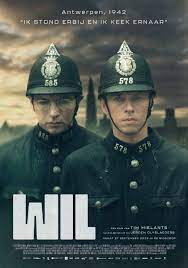
WIL
Belgium/Netherlands, 2023, 110 minutes, Colour.
Stef Aerts, Matteo Simoni, Annelore Crollet, Jean Bervoets, Jan Bijvoet, Pierre Bokma, Pit Borkowski, Jan Declier.
Directed by Tim Mielants.
The Forgotten Battle and Wil can be considered companion films, dramas of World War II taking place in the Netherlands, a focus on the city of Antwerp.
Dramas of World War II continue to be made, quite a vast number of films, ranging over the world. There have not been so many dramas of the Netherlands – there was a surprising film, Betrayed, 1954, with Clark Gable, Victor Mature and Lana Turner, alerting audiences to the war in that part of Europe.
The forgotten battle is that of the river Schelde, late in 1944. The film focuses on the German occupation of the Belgian town, a small underground group, young man taking photos of the Germans, and intentionally causing an accident with the death German soldiers, his arrest, torture, giving information. He is the son of a local doctor. His sister is concerned, close to members of the resistance, offering to take key map to the Canadians who are attacking the Germans, her being captured, her friend, wounded, floating on the boat and discovered by the Canadians. There is a grim battle sequence with the Canadians attacking, many wounded and dead. Then, with the aid of the map and strategy, there is the counter-attack.
Brought into the action of the British, a group of glider pilots, grounded near the village, encountering that is, one escaping and pointing the Canadians in their attack.
War scenes of staged, the audience gets a sense of the German occupation and harshness, and, with one Dutch soldier who had enlisted in the German army, a growing sense of disillusionment, is having to participate in the shooting of the hostages, his participation in the attack.
On the other hand, Wil takes place in 1942, a Belgian town occupied by the Germans, in full control, some of the collaborators in the town, the focus on young police, locals, the strength of their local command and his warnings to the observant, especially in his taught sequence.
Two young policeman are asked to accompany a German to arrest a Jewish family. There is some resistance, the German is killed and his body concealed in a drain. There are consequences for the two, very young, connections with the Resistance, codenames, meetings with the leader, veteran actor Jan Decleir, arrests and torture. They also help the Jewish family to be hidden, and a train journey, being captured.
The dilemma of story is, remembering the Stockholm Syndrome, how much occupied people can identify with the occupiers, moral issues, life and death, silence, support.
The film is ominous, challenging moral stances.
- A World War II story? The city of Antwerp? German occupation? Local police? Persecution of the Jews?
- Antwerp, the 1940s, the city, the streets, homes, police Academy, German occupation? Atmosphere of occupation, deprivation, patrols of the streets, roundup of the Jews? The musical score?
- The title, the focus on Will, his age, his family background, his father working in the bureaucracy, the pressure from his mother? The friendship with A load? The local force, the young recruits, inexperience? Uniforms, drills, meetings? Gene in charge, his advice to the recruits, the singing of the song, observing?
- The situation, the German soldier, asking for an escort, the two men going with him, his attitudes and arrogance, at the Jewish household, the entry, the husband and wife, the daughter, ousted? The treatment by the German? The young men and their reactions? The brutality, Will and his decision, wounding the German, his head wound, putting him in the hole? The aftermath, the secrecy? The psychological and emotional effect on them? The consequent behaviour, with the other police, with Jean?
- Will and Load the German family, rescuing, concealing them, bringing them food? Arranging the documentation? Taking them to the train? The news of the train being waylaid, the execution of the family?
- The anti-Semitic scenes, the cynical, the people fleeing, being chased? Violence?
- Lode, age, personality, friendship with Will, as police, the effect of the experience on him? His family, Will and his visits, the encounter with Yvette, her strong personality, protective of her brother, threatening Will, the family and their welcome, Wills reserve? Cab load and ambiguity of feelings?
- The German authorities, the missing German, the search, interrogation of the police, the rounding up of the Communist, the firing line, the officer in charge, cruel attitude, the killing of the Communist? The two young men, keeping quiet?
- Will and his painting, the patron of the arts, the visit, his anti-Semitic attitudes, his Nazi connections, his offering Will the studio, being a patron? The outings, the bars, drinking? The experience for Will? A citizen of Antwerp that wanting the German supremacy?
- The resistance, the young man and meetings, Will and the influence, meeting the Professor, his inspiration? Yvette? The bonding, the relationship, the effect on each? Going into action, deceiving the Germans?
- The buildup to the confrontation, the German connection, the meeting with Will, his patron, the missing body of the German? The consequences? Threats to Will? To the family?
- The confrontation with the arts patron, his death?
- Will, the pressure from his family, from Yvette? The rest of the professor, his torture, giving up names, Will and his code name of Angel? The brutality of the torture sequences, the Gestapo, the torturer?
- The rest of Jeanar, his resisting the interrogation, Will having to witness, his singing the song and urging Will to be quiet?
- The continued occupation, the dilemma for the citizens, outward loyalties, the resistance? The role of the police? Will maintaining his presence in the police, the reaction of Yvette? The conscience dilemma?